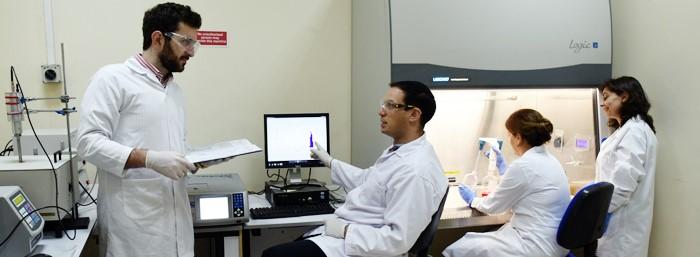- About
- Admissions
- Study at AUS
- Prospective Students
- Bachelor's Degrees
- Master's Degrees
- Doctoral Degrees
- Admission Publications
- International Students
- Contact Admissions
- Grants and Scholarships
- Sponsorship Liaison Services
- Testing Center
- New Undergraduate Student Guide
- New Graduate Student Guide
- File Completion
- New Student Orientation
- Payment Guide
- Executive Education
- Students with Disabilities
- Academics
- Life at AUS
- Research
- Contact Us
- Apply Now
- .

Groundbreaking cancer research from AUS nominated for global award
A brand new discovery in cancer treatment, led by Dr. Ghaleb A. Husseini from American University of Sharjah (AUS), is in the running for the Institution of Chemical Engineers (IChemE) Global Award—one of the highest accolades in the chemical engineering community.
Dr. Husseini, Professor and Associate Dean for Graduate Affairs and Research, and Dana Gas Endowed Chair in Chemical Engineering, and his team of researchers at the AUS College of Engineering (CEN) have been shortlisted for their investigation of the use of nano-sized carriers and ultrasound to enhance the effectiveness of chemotherapy in destroying cancer cells.
The research aims to dramatically reduce or even eliminate the destruction of healthy cells during the process of chemotherapy in order to minimize the adverse side effects of chemotherapy in cancer patients around the world.
This significant achievement sees Dr. Husseini’s research nominated for an IChemE Global Award within the pharma category, among other global finalists who have demonstrated their professional engineering expertise across a range of other industry sectors and projects, including biotechnology, energy, food and drink, oil and gas, and others.
Winners will be announced in a ceremony in Manchester, United Kingdom on November 1, 2018, as the chemical engineering industry gathers to celebrate excellence and achievement in chemical, biochemical and process engineering.
This is the second nomination for an IChemE Global Award for Dr. Husseini, who was highly commended for his presentation of a similar drug platform in 2016. This year, Dr. Husseini’s entry builds on his research to include large-scale manufacturing of his nano carriers, as well as the development of a control system that increases the effectiveness of chemotherapeutic treatment for cancer patients.
“We are all familiar with the side effects of conventional chemotherapy, where the drugs are administered systemically through the blood stream. The side effects are well known, including hair loss, a lowered immune system and problems with the gastrointestinal system. In addition, some of the chemotherapeutic drugs are also cardio toxic, which means they can kill the heart muscle. While some patients may survive the chemotherapy, they may actually die because of the toxicity of the drugs to their heart,” said Dr. Husseini.
“Through our research we have ‘packaged’ our drugs into ‘carriers’ or ‘vehicles’ and activated them with ultrasound until they reach only the cancer cells. In this way, the drugs affect only the cancer cells and not the healthy cells in the body. This way we can decrease or even eliminate the side effects of the chemotherapy,” he said.
This year’s entry will be competing with three of the world’s top pharmaceutical companies.
“We do hope to win this year. Our research has significant implications as it aims to improve the quality of life of cancer patients around the globe,” said Dr. Husseini.
Dr. Husseini’s nomination affirms the university’s new ambitious research agenda to see AUS transformed into an internationally recognized research-comprehensive university, while continuing to excel in its tradition of high caliber, American-style liberal arts education.
“This is a significant achievement for our team of researchers and for the university as a whole, and it clearly demonstrates the caliber of research we are capable of producing within our own outstanding academic community at AUS,” said Dr. Husseini.
To achieve its vision, AUS recently founded four interdisciplinary PhD-granting research institutes, two advanced research centers and a specialized laboratory, based in the university’s existing 127-hectare site, which will allow AUS to address critical global issues in health sciences, materials science, marine sciences and city planning, and to explore the effects of climate change on the environment.

